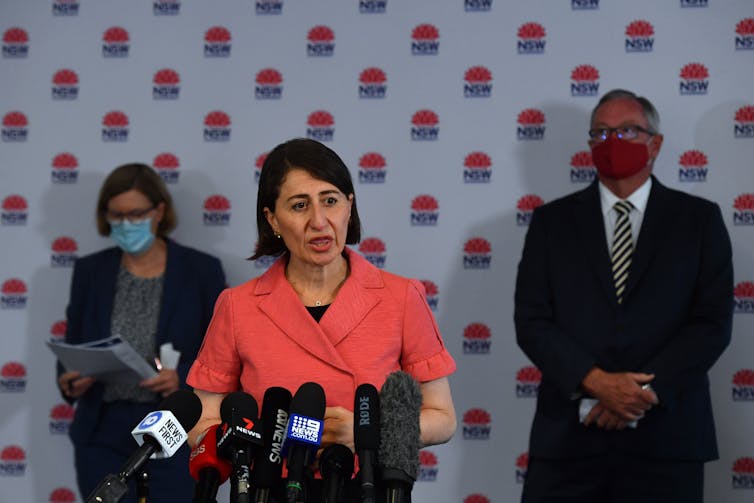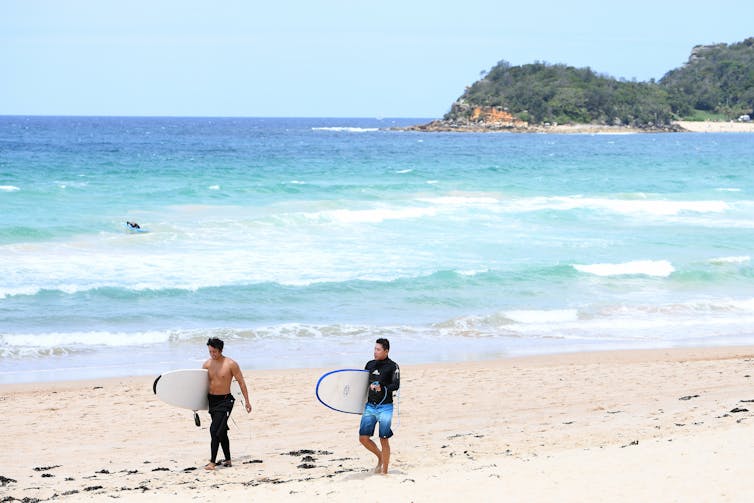Should you go to a Sydney New Year's Eve party? NSW has handled COVID outbreak well but risks remain
- Written by Catherine Bennett, Chair in Epidemiology, Deakin University
The news on the Sydney northern beaches COVID-19 outbreak is encouraging, with just five locally acquired new cases announced today from more than 15,000 tests in the last 24 hours. All five locally acquired cases were contacts of known cases and already in isolation.
The way NSW Health has managed this outbreak — and at such a tricky time of year — has been impressive, but risks remain. The number of people coming forward for testing has fallen in recent days. Worryingly, cases continue to pop up outside the northern beaches, including several around the Belrose Hotel where the chain of transmission is unclear. NSW Health has asked anyone who spent any time there during December to get tested.
New Year’s Eve presents a higher risk, because it often involves different household groups gathering indoors, talking face-to-face for extended periods, without masks. These are the conditions the coronavirus likes best.
However, there’s a lot you can do to reduce your own, and the collective, risk in coming days.
Read more: Australia on alert as Sydney's northern beaches COVID cluster grows, linked to US strain
New Year’s Eve parties: just because you can, it doesn’t mean you should
NSW has now cancelled a previous plan to offer frontline workers special access to the harbour foreshore to watch the New Year’s Eve fireworks display. NSW Premier Gladys Berejiklian has encouraged everyone to stay out of the Sydney CBD for New Year’s unless they have a permit from Service NSW.
Tighter restrictions remain in place for people in the northern beaches area.
In Greater Sydney, however, you can have up to ten visitors in your home (including children) for New Year’s. Outdoor gatherings have been capped at 50, as long as people are socially distanced and separate groups don’t mingle.
But just because you can do these things doesn’t mean you should. It’s like a speed limit — you don’t have to drive at the maximum.
If you’re planning to go to a party in Sydney on New Year’s, think quite carefully about whether you really need to. New Year’s decisions should include doing everything possible to support what NSW Health is trying to do — and that might mean staying home.
Don’t create the opportunity for you to be linked to the next NSW cluster; being linked as a casual contact to an outbreak can mean an incredibly inconvenient period of quarantine for you and your household, even if you don’t get the virus. The less mixing everybody does, the better.
If you must get together, do what you can to reduce risk — try to make the gathering outdoors or in a well-ventilated space, encourage physical distancing, avoid crowding around drink or snack tables and keep a record of all attendees.
 NSW Premier Gladys Berejiklian encouraged everyone to stay out of the CBD for New Year’s unless they have a permit.
MICK TSIKAS/AAP
NSW Premier Gladys Berejiklian encouraged everyone to stay out of the CBD for New Year’s unless they have a permit.
MICK TSIKAS/AAP
Encouraging response but risks remain
Overall, I’m confident in how this outbreak is being managed by NSW Health. The way they are communicating cases details and their understanding of risk, the amount of detail contact tracers are gathering within the first critical hours, the updated lists of exposure sites and the high testing rates this has encouraged — it’s all reassuring.
However, there are still cases of community transmission where the exact relationship to known cases is unclear — and that could signal a potential new cluster.
That terrible mix of someone at their most infectious taking the virus into an enclosed space, being face-to-face with others, with no mask — that’s the worrying scenario that could drive an escalation in numbers.
That’s what NSW saw with the Crossroads Hotel outbreak in July. It took months to shut it down as it kept reappearing in new clusters because there were ongoing insidious chains of transmission.
The same could happen if the virus spreads into greater Sydney, or beyond.
It’s important to remember we are still not quite capturing all the cases in this outbreak, despite the generally high level of testing. And so it’s vital testing levels remain high.
Crucially, people should consider repeat tests if they were near any of the exposure sites. If you test negative in the early days after exposure, you might still be incubating the virus and could become infectious and test positive a week or more later. You are not in the clear until 14 days after exposure, so if you get symptoms, you must re-test. And even if you don’t, it’s worth re-testing after day 11.
 If you’re outdoors at the beach and you maintain physical distance from others, it’s not as risky as going to shopping centres or supermarkets without a mask.
DAN HIMBRECHTS/AAP
If you’re outdoors at the beach and you maintain physical distance from others, it’s not as risky as going to shopping centres or supermarkets without a mask.
DAN HIMBRECHTS/AAP
What about the beach or the gym?
In general, I am less worried about Sydney beach visits than I am about household gatherings. If you’re outdoors at the beach and you maintain physical distance from others, it’s not as risky as, say, going to shopping centres or supermarkets without a mask. You absolutely should be wearing a mask in Sydney if you are on public transport or visiting any indoor crowded area with people outside your household.
If you’re a Sydney-sider considering hitting the gym after Christmas, make sure the gym is operating in a COVID-safe way. Is equipment cleaned regularly? Are numbers tightly controlled so distancing can be maintained? If you get to the gym and it’s crowded, turn around and head home. Go for a walk or a run instead. A crowded Sydney gym is not where you want to be right now.
Outbreak control is about individual responsibility but it’s also about what the community does as a whole. We don’t ever count on everyone doing the right thing all of the time but if most of us do, we will reduce the risk to ourselves and our loved ones, and help NSW Health get on top of this faster. And that means a speedier return to normality.
Read more: How to reduce COVID-19 risk at the beach or the pool
Authors: Catherine Bennett, Chair in Epidemiology, Deakin University





